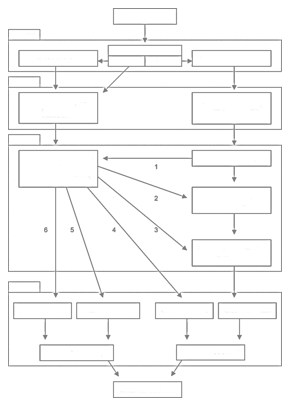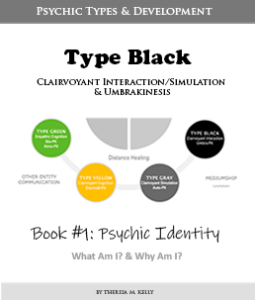- Why Am I? (Type Gray)
- Personality Type #1 (Type Gray)
- Personality Type #2 (Type Gray)
- Attention & Psychic Experiences (Type Gray)
- Why You Have Psychic Experiences (Type Gray)
- Your Needs & Clairvoyant Simulation (Type Gray)
- Needs & PK Experiences (Type Gray)
- Events and Psychic Experiences (Type Gray)
- Personality Changes & Psychic Experiences (Type Gray)
- Your Environment & Psychic Experiences (Type Gray)
- Age & Psychic Experiences (Type Gray)
- Psychic Awareness (Type Gray)
- Psychic Illusions (Type Gray)
- Belief, Meaning, & Auto Labeling (Type Gray)
- Self-fulfilling Prophecies & Ignoring When You’re Wrong (Type Gray)
- Probability & Reason (Type Gray)
- Don’t Be Fooled (Type Gray)
- Seeing Faces & Hearing Your Name (Type Gray)
- Precognition vs. Probability Shifting (Type Gray)
- Accuracy, OBEs, & Evil Presence (Type Gray)
- Weird Does Not Equal Psychic (Type Gray)
- Confusing Negative & Positive Experiences (Type Gray)
- Externalizing (Type Gray)
- Ignoring Negative Psychic Experiences (Type Gray)
- Avoid Shortcuts (Type Gray)
- Psychic Protections (Type Gray)
- #1st List of Psychic Protections (Type Gray)
- #2nd List of Psychic Protections (Type Gray)
- #3rd List of Psychic Protections (Type Gray)
- Psychic Illusions Mini-Quiz – Are You Being Fooled? (Type Gray)
- Mini-Quiz: Prone to Psychic Experiences? Ready to Enhance? (Type Gray)
- Mini-Quiz: Anxious? Depressed? (Type Gray)
PERSONALITY TYPE #1
Let’s go a little deeper, shall we?
OK, first you should know that the first set of traits, which are relatable most towards INTP’s, make up only 1-5% of the population. This may seem like there are very few people out there like you, but this actually means that, using the U.S. population for an example, there are about 3,189,000 to 15,945,000 out of a population of 318.9 million people just like you. That’s a lot of people!!
 Ok, let’s look at this set of personality traits:
Ok, let’s look at this set of personality traits:
These Grays are quiet, thoughtful, and are deep thinkers who usually enjoy spending a lot of time on their own. They do this to gather their thoughts, work through problems, and create solutions.
They are very curious people who love to learn about how thing work. Because of this, they are usually found in careers like engineering, applied physics, mathematics, architecture, and law.
Due to their lack of interest in social situations, they are not usually found in caring professions, like nursing or other caretaking fields. However, they do enjoy the company of those with similar interests. They are very independent people, and usually spend time with other people who value and have similar levels of independence.
 They usually don’t like change, and ignore people who ask them to change. They are usually impatient with complicated and ridged rules, levels of management, and the politics common in many lines of work.
They usually don’t like change, and ignore people who ask them to change. They are usually impatient with complicated and ridged rules, levels of management, and the politics common in many lines of work.
They have little use for titles and badges, because they often think of them as having no useful purpose.
They usually have little trust and respect towards people and institutions in a position of authority. This is because they usually see those “in charge” as interfering with the acceptance of new and interesting ideas and the search for knowledge.
They accept ideas based on the quality of the ideas or the evidence to support those ideas. This is because they are usually unwilling to accept ideas only on the basis of it being an idea held by someone in a position of authority.
They have little patience for social customs that they view as wasteful, illogical, confusing, or that serve as difficulties in seeking out and exploring new and interesting ideas and knowledge.
 They usually stand out from the crowd as passionate people who don’t like following the rules, and prefer to work casually with other people as equals.
They usually stand out from the crowd as passionate people who don’t like following the rules, and prefer to work casually with other people as equals.
They usually express their understanding of subjects and topics through the clear explanation of ways of thinking, basic truths and principles, and are especially drawn to educated guesses and explanations – hypotheses and theories.
They can demonstrate amazing skill in explaining complex ideas to others in simple terms, especially through writing.
However, their ability to understand complex ideas can lead them towards overly detailed explanations of simple ideas. Therefore, they are seen as people that can make things harder than they need to be.
 Either way, they try their best to present all the important information or they attempt to explain concepts as clearly as possible.
Either way, they try their best to present all the important information or they attempt to explain concepts as clearly as possible.
They usually prefer to work alone due to their very independent nature, and usually when in groups, are more focused on gathering information.
Because of this, they may often appear to others as distant or disconnected as they trail in an out of deep thought.
They are driven to understand topics and discussions from all points of view, and are usually impatient towards ideas brought up in debates that seem unable to be supported or defended.
They are quite clever and often calm themselves and other people down with comical statements and references to reduce tension.
They can be charming and fascinating due to being so quiet and “mysterious,” and their friends, family, and co-workers usually have a high opinion of them, even though these Grays may often appear surprised by this.
 They often find their emotions hard to handle, especially when they think they are being insulted. However, they usually believe that emotions should not play a role in logical discussions, or be expressed in manner that could lead towards their disadvantage.
They often find their emotions hard to handle, especially when they think they are being insulted. However, they usually believe that emotions should not play a role in logical discussions, or be expressed in manner that could lead towards their disadvantage.







